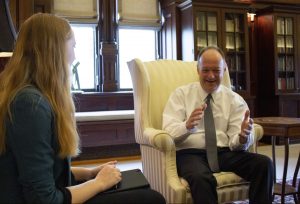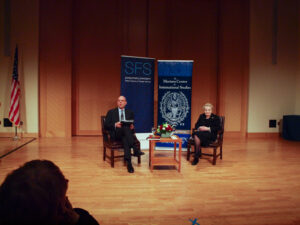On Tuesday, the Voice spoke with the incoming Dean of the Walsh School of Foreign Service, Joel Hellman, Ph.D.
Why Georgetown? What do you find appealing about our University, specifically SFS?
Throughout my career, I’ve always thought that the the best way to try to solve and engage in some of these places is by really trying to merge big ideas with practical realities. What excites me about Georgetown is that it’s a school that’s designed to be that. It’s got service in its title, it’s got faculty engaged in a broader world of ideas, but also many of whom are engaged in various different ways to applying those ideas to practice. Because it’s in Washington, there’s that headed incentive to engage with those who are doing the implementation. Georgetown has always been a place I’ve looked at for ideas, inspirations, and I was thrilled to hear what they have for research because I think it’s an ideal intersection of big ideas and practice.
Are there are any parts of the SFS curriculum or majors that you’d like to advocate or change?
The first thing I’ll do is to listen to the different members of the SFS community. The centennial anniversary gives the opportunity to the whole community to think through the kind of education we’ve been providing and providing very well by all account … What I’ll do is to bring together faculty staff students to have those conversations about how relevant is the educational curriculum that we’ve got, new challenges, and what needs to be changed. That dialogue will be about the nature of what we’re teaching, the subject areas, how we can integrate better with other parts of the school, how we can better integrate ourselves, and the nature of the core.
Another thing about it is that I want to get the information about the students themselves. How are the nature of the students coming to SFS changed over the years ? How are they changing and what are the trends? What are they doing after SFS, and how do they see their SFS education maybe four, five years out, preparing for the type of work they’re doing? I really want to hear not only from the current students but also look at the trends and data about where our students are going and what that says about our program and how we’re preparing them for current issues.
During your time as a dean, do you plan to pursue additional research?
Fundamentally, one of the reasons why I’m coming back to university setting in Georgetown is to re-engage in my own research and teaching. I started a lot of research at the World Bank, on a range of issues on state building in some of the most difficult contexts. That’s research that I’ll certainly want to continue with a lot of collaborators both in the World Bank and other academic institutions. It will take a little while to settle in and return to those, but that is a big motivation for coming back.
What did you research during your time at the World Bank?
A lot of my previous research and what I’m still interested in looked at the relationship between business and government. Not only how government shaped the environment for business, but also how business engages with government…and how that impacts overall economic development. I think we need a much more consistent approach especially in developing countries to see how the business community interacts with the state and what that means for the economic outcome.
The other thing that I started working on now is to look at the nature of bureaucracy especially in poor developing countries. We have stereotypes about bureaucrats … They’ve almost become a second nature that we accept. So we’re trying to look more closely at bureaucratic behavior especially at local level and try to understand what motivates bureaucrats. In some cases it’s money, in some cases it’s norms and values, and in some cases it’s being part of a community. How that shapes their behavior and how it differs from what we normally think of as bureaucracy in more advanced country.
You probably heard about the Global Business major. Is that along your line of thinking?
In the Global Business program … whether it be social dislocation, natural resource extractions, and what that means to the community, I think it’s really critical that people who are engaged in global business to have a broader perspective. First of all, it’s the right thing to do, and second of all, it ultimately impacts their business down the road. I think it’s part of the Jesuit mission of creating social responsibility and how people think in long term. I’m very excited about that major and I think it’s a great initiative.
Last Comments?
The one thing I would say is that I am really eager to hear from students. I want to hear about their experience in the SFS, what they think they’re getting from the SFS degree, what they think they’re missing from the SFS degree, and where they think it’s helping in preparing for the next step.




